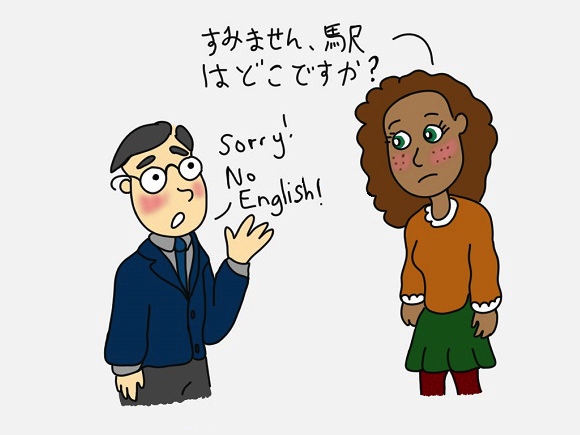
A while back, we had some fun talking about five of the more noteworthy types of foreigners you’ll meet in Japan, based upon observations drawn from our time spent working and living here in the Land of the Rising Sun. Whether you’re a Plastic Sensei, Hateimus Japanicus, Secret Ninja, Bubble Dweller or Kid in a Candy Store (or indeed, all of these at different times), we reckon there’s probably quite a lot foreign residents can find to nod their heads at when considering each of those five extreme types.
But what about the flip side of the coin? Spend enough time as a foreigner in a country like Japan—a place that’s 98.5% ethnically Japanese—and you’ll be sure to notice that Japanese people will approach you, the foreigner, in a number of different ways. Today we’d like to share our thoughts on six kinds of Japanese people foreigners might meet during their time in Japan. See how many of them you’ve come across during your time traveling or living in the country!
Let’s start off with one of the first types of people foreigners encounter when they come to Japan. You’re a lot more likely to spot and appreciate these folks while you’re deep in your Kid in the Candy Store phase, i.e. when you find everything amazing and worthy of a photo. Tourists and exchange students usually have plenty of tales to tell about these folks, and they truly are the salt of the earth. We’re talking, of course, about…
The Helpful Hito
Hito means ‘person’ in Japanese, and the Helpful Hito always has one eye open looking for foreigners in distress. They’ll swoop in, desperate to assist you somehow and ensure that your impressions of Japan are positive. In fact, long-time foreigners are wary of spending too much time standing still and spacing out in public in case a Helpful Hito mistakes them for a traveller in need and asks them if they need directions (it can get embarrassing if you were just contemplating what to have for dinner, or killing time until a friend arrives!).
The Helpful Hito is basically a tourist’s best friend, since they can help you out in a pinch and point you towards the right train station platform, bus stop, or simply bat your incompetent paws away from the breakfast buffet at your hotel when you accidentally try to put salt in your coffee before you’ve learned the kanji for sugar (Wasn’t me, I swear). Part of the reason behind the Helpful Hito’s existence is that a lot of folks in Japan just tend to be downright nice anyway, not just to foreigners but to each other. If you drop something, they’ll chase you down to return it. If you’re dripping water from your umbrella onto your shoes and the nice department store floor, they’ll show you how to use the umbrella condom machine (I’m so sorry for that mental image, but it’s the best way I can think of to explain those contraptions which dispense polythene sheathes for your umbrella).
The Gaijin Hunter
I think we all knew this one was coming at some point. The phenomenon of the Gaijin Hunter is one that almost every foreigner who has lived in Japan will be familiar with. In fact, quite a lot of people who have spent an extended period of time here will attest to having met, and possibly having even been ensnared by, at least one Gaijin Hunter. They can be difficult to spot at first—you might just think you’re on really good form or are having a run of good hair days. Eventually, though, you might start to get the icky feeling that the person lavishing you with attention probably wouldn’t be quite so interested if you were just another regular Joe nihonjin.
Of course, there’s nothing wrong with being interested in foreigners and foreign culture, or finding foreign guys or gals especially attractive. No, the problem arises when the Gaijin Hunter in question really doesn’t care about the actual person they’re with—their personality, likes and dislikes, even their looks to a degree—so long as they’re a foreigner. On the arm of or with your arm around a GH, you become nothing more than gaijin arm candy to be shown off in public. Once you’ve been here a while, your spidey senses will quickly become attuned to sussing out when someone sees you as nothing more than a rare and exotic accessory to show off, and you’ll be able to dodge them quite easily. Unless, of course, you’re completely fine with the arrangement, in which case, the hunter might become the hunted!
The International Ninja
Imagine you’ve known someone for quite a while, working with or around them on a near daily basis, and have come to be quite friendly. They don’t talk that much about themselves, and in general they seem as Japanese as miso soup. Then, one night at a work night out, they open their mouth and a torrent of grammatically perfect, flawlessly pronounced English gushes forth. Surprise! Your work buddy, who has patiently sat through months of your garbled attempts to not totally butcher the Japanese language, is actually fluent in English and once spent a few years living overseas!
These International Ninjas conceal their worldly knowledge often for a variety of reasons, which might include not wanting to stand out or wanting to avoid looking like a show-off. Some English teachers who work as ALTs in Japanese schools notice this phenomenon when they have kikokushijo (returnee) students in their classes. Despite having lived abroad with their parents and subsequently learning to speak fluent English, these kids tend to hide their abilities or goof off in English lessons to avoid standing out in front of their classmates (which is kind of a shame, when you think about it). Whatever their motivation, the International Ninja will usually reveal themselves at some point, although it might take a bucket of beer or the forging of a close friendship to get them to drop their ninja disguise and talk American TV shows with you.
The Wannabe Westerner
We love it when Japanese people are interested in foreign countries and cultures, especially if they happen to be interested in our specific country and culture. Learning a second language, travelling, and expanding one’s cultural horizons are amazing things for any human being on planet Earth to be doing, and the last thing we’d ever want to do is cut down someone trying to do just that. Unfortunately, every now and then you might come across someone in Japan who’s a bit of a bore on the whole issue. They think Japan sucks and can’t wait to move overseas. They frequent gaijin bars (and sometimes morph into Gaijin Hunters), and frequently talk about how Japanese society is rigid and unyielding. They’ll refuse to speak to you in Japanese, or talk about Japan at all. All they wanna talk about is the place you’ve just come from. Occasionally, their bubbling enthusiasm for foreign cultures can lead to insensitive gaffes like loudly repeating explicit profanity they’ve picked up from some of the more colourful TV and movie exports. Sometimes, however, some people just find that they fit better into a culture other than the one they were born into, and that’s totally okay, too.
The English Vampire
The English Vampire tends to be a subset of the Wannabe Westerner. This one might seem a little out there, but we’ve come across many tales of this type of person, as well as encountering a few ourselves, so we know this one does happen. The English Vampire is a person who cold-approaches foreigners they spot out and about for impromptu English practice. Their intentions are benign enough – they simply want an opportunity to test out their English, and you are the lucky foreigner selected for the task. Unfortunately, English Vampires can be a little blind to the fact that not every foreigner walking around is dying to stop and chat in English. Sure, we’ll say hi and how are you if we’re not in a rush, but often the English Vampire isn’t actually that interested in knowing anything about their foreign prey, or having an actual conversation—they’d simply like to talk about themselves (their age, their hobbies, experiences abroad, and so on) and you, as temporary selected English sensei, must be quiet and listen. After all, how often does the English Vampire manage to capture a real live foreigner (remember, Japan has a population that’s 98.5 percent ethnically Japanese) to be the sounding board for their English skills?
Uncouple this from the fact that being bugged by random people in the street isn’t something that many people, foreign or otherwise, enjoy, and the other issue is that you’re basically using people for your own ends. After all, Japan is positively bursting with English conversation schools, at which thousands of foreigners make their living, so there’s really no need to be approaching complete strangers when you could just sign yourself up for classes or join an online language-exchange.
While some might think that any foreigner who rejects a Japanese person’s request for a street lesson is nothing more than a stingy old meanie, we do think there’s something a little presumptuous about the supposition that any visibly non-Asian person walking down the street is just dying to give you English lessons for free. There’s also something a little presumptuous about the supposition that any visibly non-Asian person speaks fluent English, but I digress.
The Gaijin Reminder
Perhaps this one is just an inevitable result of being a very visible minority in a very homogeneous nation. The Gaijin Reminder is someone who, for whatever reason, really needs to keep foreigners in a box marked ‘other’. While it’s pretty futile to think you’ll ever become Japanese (you won’t) or that you’ll ever be able to move about undetected as a foreigner (you won’t) or that Japanese people might stop thinking of you as a foreigner after they get to know you (they probably won’t, at least not completely), it still sucks sometimes to be constantly reminded that you are forever gaijin. Yes, we’re talking about those people who insist on responding to you in English when you try to talk to them in Japanese, even if you’ve lived here 10 years and are functionally fluent and they barely paid attention in high school English classes. The people who immediately hand you a knife and fork and whip away your chopsticks in a restaurant. You’re a foreigner, so you must not know how to use traditional Japanese utensils, right?
Some of this, admittedly, is perfectly innocent and goes back to the Helpful Hito, who would rather accommodate you in your foreign language than subject you to the struggle of trying to speak Japanese. The problem is that this mindset ignores the fact that many foreigners can, in fact, speak Japanese and understand the intricacies of Japanese society. By-and-large, the reverse is often true (especially for tourists passing through), but treating everyone as a clueless tourist does a disservice to those who have actually studied hard and attempted to integrate into society. It’s demoralising to hear people loudly proclaim how “strange” it is that you are able to have a “normal” conversation with them in Japanese, and while it’s meant as a compliment, it stings of damning with faint praise, especially if the other person knows you’ve studied Japanese/lived here for years and years. Again, though, we do have to consider the social situation as a whole—we can’t expect others to immediately think of us as special snowflakes who aren’t like the rest of the gaijin masses (and nothing is more obnoxious than the fluent foreigner who is snide to Japanese shop staff who politely try to speak to them in English). Perhaps we should try to appreciate the sentiment behind this over-accommodating behaviour rather than taking it as a personal affront and source of irritation.
Have you met any of these types during your time in Japan? And are we just whingeing gaijin windbags, or is there a nugget of truth to these observations? You know where to tell us!
All images © RocketNews24
Now read:








 Japanese people give their thoughts on Gaijin Hunters/English Vampires
Japanese people give their thoughts on Gaijin Hunters/English Vampires Have Japan’s “share houses” become a target for women seeking gaijin baby daddies?
Have Japan’s “share houses” become a target for women seeking gaijin baby daddies? Nihon-no: Is an entirely English-speaking village coming to Tokyo?
Nihon-no: Is an entirely English-speaking village coming to Tokyo? Westerners in Japan – do they really ALL speak English? 【Video】
Westerners in Japan – do they really ALL speak English? 【Video】 Looking for a job in Japan? New “Sugoi Kawaii” maid cafe in Akihabara now hiring foreigners!
Looking for a job in Japan? New “Sugoi Kawaii” maid cafe in Akihabara now hiring foreigners! McDonald’s new Happy Meals offer up cute and practical Sanrio lifestyle goods
McDonald’s new Happy Meals offer up cute and practical Sanrio lifestyle goods All-you-can-drink Starbucks and amazing views part of Tokyo’s new 170 meter-high sky lounge
All-you-can-drink Starbucks and amazing views part of Tokyo’s new 170 meter-high sky lounge Studio Ghibli glasses cases let anime characters keep an eye on your spectacles
Studio Ghibli glasses cases let anime characters keep an eye on your spectacles McDonald’s Japan releases a pancake pie for new retro kissaten coffeeshop series
McDonald’s Japan releases a pancake pie for new retro kissaten coffeeshop series Starbucks reopens at Shibuya Scramble Crossing with new look and design concept
Starbucks reopens at Shibuya Scramble Crossing with new look and design concept The oldest tunnel in Japan is believed to be haunted, and strange things happen when we go there
The oldest tunnel in Japan is believed to be haunted, and strange things happen when we go there Super Nintendo World expansion gets delayed for several months at Universal Studios Japan
Super Nintendo World expansion gets delayed for several months at Universal Studios Japan We try out “Chan Ramen”, an underground type of ramen popular in the ramen community
We try out “Chan Ramen”, an underground type of ramen popular in the ramen community Beautiful Sailor Moon manhole cover coasters being given out for free by Tokyo tourist center
Beautiful Sailor Moon manhole cover coasters being given out for free by Tokyo tourist center More foreign tourists than ever before in history visited Japan last month
More foreign tourists than ever before in history visited Japan last month Disney princesses get official manga makeovers for Manga Princess Cafe opening in Tokyo
Disney princesses get official manga makeovers for Manga Princess Cafe opening in Tokyo Beautiful new Final Fantasy T-shirt collection on the way from Uniqlo【Photos】
Beautiful new Final Fantasy T-shirt collection on the way from Uniqlo【Photos】 Is the new Shinkansen Train Desk ticket worth it?
Is the new Shinkansen Train Desk ticket worth it? Foreign English teachers in Japan pick their favorite Japanese-language phrases【Survey】
Foreign English teachers in Japan pick their favorite Japanese-language phrases【Survey】 Japanese convenience store packs a whole bento into an onigiri rice ball
Japanese convenience store packs a whole bento into an onigiri rice ball Studio Ghibli releases Kiki’s Delivery Service chocolate cake pouches in Japan
Studio Ghibli releases Kiki’s Delivery Service chocolate cake pouches in Japan Japan’s bone-breaking and record-breaking roller coaster is permanently shutting down
Japan’s bone-breaking and record-breaking roller coaster is permanently shutting down New definition of “Japanese whiskey” goes into effect to prevent fakes from fooling overseas buyers
New definition of “Japanese whiskey” goes into effect to prevent fakes from fooling overseas buyers Our Japanese reporter visits Costco in the U.S., finds super American and very Japanese things
Our Japanese reporter visits Costco in the U.S., finds super American and very Japanese things Studio Ghibli unveils Mother’s Day gift set that captures the love in My Neighbour Totoro
Studio Ghibli unveils Mother’s Day gift set that captures the love in My Neighbour Totoro Foreign passenger shoves conductor on one of the last full runs for Japan’s Thunderbird train
Foreign passenger shoves conductor on one of the last full runs for Japan’s Thunderbird train Domino’s Japan now sells…pizza ears?
Domino’s Japan now sells…pizza ears? New Japanese KitKat flavour stars Sanrio characters, including Hello Kitty
New Japanese KitKat flavour stars Sanrio characters, including Hello Kitty Kyoto creates new for-tourist buses to address overtourism with higher prices, faster rides
Kyoto creates new for-tourist buses to address overtourism with higher prices, faster rides Sales of Japan’s most convenient train ticket/shopping payment cards suspended indefinitely
Sales of Japan’s most convenient train ticket/shopping payment cards suspended indefinitely Sold-out Studio Ghibli desktop humidifiers are back so Totoro can help you through the dry season
Sold-out Studio Ghibli desktop humidifiers are back so Totoro can help you through the dry season Japanese government to make first change to romanization spelling rules since the 1950s
Japanese government to make first change to romanization spelling rules since the 1950s Ghibli founders Toshio Suzuki and Hayao Miyazaki contribute to Japanese whisky Totoro label design
Ghibli founders Toshio Suzuki and Hayao Miyazaki contribute to Japanese whisky Totoro label design Doraemon found buried at sea as scene from 1993 anime becomes real life【Photos】
Doraemon found buried at sea as scene from 1993 anime becomes real life【Photos】 Tokyo’s most famous Starbucks is closed
Tokyo’s most famous Starbucks is closed One Piece characters’ nationalities revealed, but fans have mixed opinions
One Piece characters’ nationalities revealed, but fans have mixed opinions We asked a Uniqlo employee what four things we should buy and their suggestions didn’t disappoint
We asked a Uniqlo employee what four things we should buy and their suggestions didn’t disappoint Princesses, fruits, and blacksmiths: Study reveals the 30 most unusual family names in Japan
Princesses, fruits, and blacksmiths: Study reveals the 30 most unusual family names in Japan 7 things Japanese people in international marriages wish they’d known before tying the knot
7 things Japanese people in international marriages wish they’d known before tying the knot Japanese expat remembers the words that changed his life when he started working in Australia
Japanese expat remembers the words that changed his life when he started working in Australia English conversation school in Japan has clever reminder that students don’t have to be perfect
English conversation school in Japan has clever reminder that students don’t have to be perfect Japanese woman stumbles on the power of the infamous “gaijin seat” phenomenon during flight
Japanese woman stumbles on the power of the infamous “gaijin seat” phenomenon during flight RocketNews24’s six top tips for learning Japanese
RocketNews24’s six top tips for learning Japanese What’s wrong with English education in Japan? Pull up a chair…
What’s wrong with English education in Japan? Pull up a chair… North Japan prefecture creates guide to help new foreign workers understand local language quirks
North Japan prefecture creates guide to help new foreign workers understand local language quirks English pick-up lines: Foreign writer shares his advice with amorous Japanese men
English pick-up lines: Foreign writer shares his advice with amorous Japanese men Why is Japan such an unpopular tourist destination?
Why is Japan such an unpopular tourist destination? Japanese Twitter user embarrassed to learn why American friend is studying Japanese, not Chinese
Japanese Twitter user embarrassed to learn why American friend is studying Japanese, not Chinese Did Starbucks Japan forget to translate this important food allergen warning?
Did Starbucks Japan forget to translate this important food allergen warning? Asian foreigners give their thoughts on what life is like being Asian in Japan
Asian foreigners give their thoughts on what life is like being Asian in Japan Foreign English teachers in Japan pick their favorite Japanese-language phrases【Survey】
Foreign English teachers in Japan pick their favorite Japanese-language phrases【Survey】 There’s no need to care about our staff, because they’re foreigners, says Japanese maid service
There’s no need to care about our staff, because they’re foreigners, says Japanese maid service Are Japan’s efforts at internationalization succeeding or not?
Are Japan’s efforts at internationalization succeeding or not? What do Japanese people think of Black- and Asian-Americans?【Video】
What do Japanese people think of Black- and Asian-Americans?【Video】
Leave a Reply